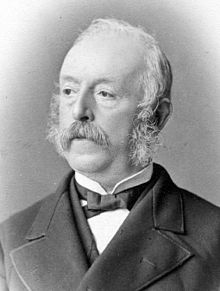Marco Minghetti
| Marco Minghetti | |
|---|---|
 |
|
| 5th Prime Minister of Italy | |
|
In office 10 July 1873 – 25 March 1876 |
|
| Monarch | Victor Emmanuel II |
| Preceded by | Giovanni Lanza |
| Succeeded by | Agostino Depretis |
|
In office 24 March 1863 – 28 September 1864 |
|
| Monarch | Victor Emmanuel II |
| Preceded by | Luigi Carlo Farini |
| Succeeded by | Alfonso Ferrero La Marmora |
| Personal details | |
| Born |
18 November 1818 Bologna |
| Died | 10 December 1886 (aged 68) Rome |
| Political party | Historical Right |
Marco Minghetti (18 November 1818 – 10 December 1886) was an Italian economist and statesman.
Minghetti was born at Bologna, then part of the Papal States.
He signed the petition to the Papal conclave, 1846, urging the election of a liberal pope, and was appointed member of the state council summoned to prepare the constitution for the Papal States. With Antonio Montanan and Rodolfo Audinot he founded at Bologna a paper, Il Felsineo. In the first constitutional cabinet of the Papal States, presided over by Cardinal Antonelli, Minghetti held the portfolio of public works, but after Pius IX publicly spoke against the Italian Risorgimento he resigned and joined the Piedmontese army as captain on the general staff.
Returning to Rome in September 1848, he refused to form a cabinet after the assassination of Pellegrino Rossi (15 November), and spent the next eight years in study and travel. Summoned to Paris by Cavour in 1856 to prepare the memorandum on the Romagna provinces for the Paris congress resolving the Crimean War, he was in 1859 appointed by Cavour secretary-general of the Piedmontese Foreign Office. In the same year he was elected president of the assembly of the Romagna after the rejection of pontifical rule by those provinces, and prepared their annexation to Piedmont.
Appointed Piedmontese minister of the interior, he resigned office shortly after Cavour's death, but was subsequently chosen to be minister of finance by Farini, whom he succeeded as Prime Minister in 1863. With the help of Emilio, marquis Visconti-Venosta he concluded (September 15, 1864) the September Convention with France, whereby Napoleon III agreed to evacuate Rome, and Italy to transfer her capital from Turin to Florence. The convention excited violent opposition at Turin, in consequence of which Minghetti was obliged to resign office. He took little part in public life until 1869, when he accepted the portfolio of agriculture in the Menabrea Cabinet.
...
Wikipedia
